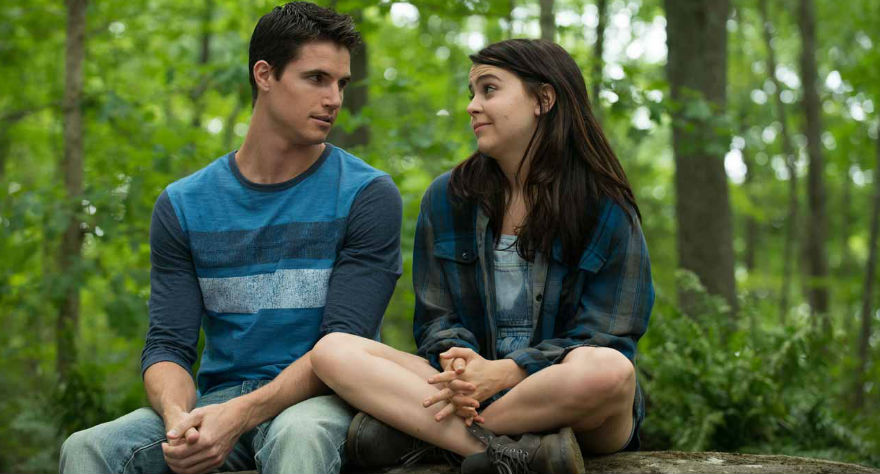
Whitman wows in this sweet, if slightly outdated, high-school dramedy.

Whitman wows in this sweet, if slightly outdated, high-school dramedy.
There are two kinds of high-school movies: ones that understand teenagers, and ones that don’t. The ones that don’t depict teens as walking clichés, stilted, porcelain caricatures that feel about as human as cyborg spies manufactured by aliens to take over our planet. (You’ll never convince me that the kids in High School Musical aren’t alien robots. They are a threat. The one they call “Efron” is still mesmerizing our women with his engineered abs.) Teens feel like human beings with souls and scars in The Breakfast Club, Brick, and even in lighter fare like Superbad and Clueless, and as a result these movies have resonated and stood the test of time.
The DUFF is a curious case in that it constantly teeters on the fence between the two categories in a peculiar way. Directed by Ari Sandel and adapted by Josh A. Cagan from a Kody Keplinger novel, the film on the surface seems to have a good grasp on how teens operate. The characters feel real, with the effortlessly adorable Mae Whitman leading the pack of young actors and imbuing the proceedings with ample heart. But when you take a closer look at the morality tale at the heart of the story, you’ll notice that its premise is more than a little wonky, and oddly outdated. I’m not sure the movie’s got a lesson to teach that most teens these days haven’t already figured out for themselves.
Whitman plays Bianca, a geeky honor student whose two tall, posh, beautiful best friends, Jess and Casey (Skyler Samuels and Bianca A. Santos, respectively), are adored by the entire student body. The three are inseparable, but Bianca, with her pint-sized stature, aversion to fashion trends, and obsession with old arthouse films (she’s of my tribe), draws the gaze of no one, including her guitar-dude crush, Toby (Nick Eversman). She’s a nobody, an outsider squatted cheek-in-palm on the bottom rung of the social ladder. She’s always got Wesley (Robbie Amell) on her side, though, her hot-but-dumb childhood friend and most popular bro in school (he’s the “Efron”). His stuck-up ex-girlfriend, Madison (Bella Thorne), doesn’t take to kindly to his friendship with Bianca, but they swear their bond is platonic.
Bianca and Wesley get along well despite being polar opposites in every way (their antithesis is a bit on-the-nose), but the old friends have a falling out when Wesley jokingly informs Bianca that she’s the DUFF (Designated Ugly Fat Friend) of her BFF triumvirate with Jess’n’Casey. She’s the perpetually friend-zoned gatekeeper between her prettier friends and their ogling suitors. The girls don’t see her that way, but she’s so shaken by Wesley’s inadvertently cruel comments that she breaks up with her clique, determined to prove she isn’t the DUFF. Bianca eventually makes up with Wesley and uses him as a fountain of dating advice in her quest to woo the shaggy-haired Toby. She’s surprised (we’re not) when she begins to develop romantic feelings for the muscle-bound Wesley, the boy she used to take baths with as a toddler. Suddenly, bitch-queen Madison becomes a serious problem. The DUFF isn’t exactly a high-stakes affair, but it’s entertaining and funny and sweet nonetheless.
Bianca’s social paranoia and struggle to be comfortable in her own skin speaks pretty accurately to the common high school experience, but some of the finer details of the storytelling feel less in-touch. When a video of Bianca giving a mannequin a lap dance goes viral, she’s laughed at and jeered by every kid at school as she walks down the hall to her locker, humiliated Carrie-style. I know, I know–kids are mean. I was a victim of hallway embarrassment myself. But it just seems very–uh, shall we say, “Disney Channel”–that no students come to Bianca’s defense by telling people to back off and leave her alone. I’m of the mind that teens today (especially high school seniors) are generally smart and compassionate enough that we can finally lay this Hollywood cliché to rest.
What seems most out-of-touch about the script is its messaging. The fact that nerdy Bianca’s closest friends are the most popular girls in school and the most popular guy in school signifies the death of the old jock/geek/princess/basket-case high school tribalism that’s now largely a thing of the past. I went to high school over ten years ago, and even back then I experienced no such social partitions, because we all know that labels are dumb. This is not a new idea. And yet, the film relies on these outdated labels, and even creates a new one, to convey the idea that you should be proud of who you are and not be defined by a label. But…but…we already got rid of the labels! The film also posits that we’re all DUFFs in a way, and that we should embrace it. So…so…embrace our inner “ugly” and “fat”? Huh? I’m willing to admit I may be over-thinking things, but I’m also convinced there’s a more elegant way to get a message of self-love across.
Whitman is the best thing in the movie by miles. She’s so naturally witty, pretty, and quick on her feet that she’s a bit unbelievable as an outcast, but she makes the movie incredibly watchable, and that’s the most important thing. Amell is very good when he partners with Whitman, but only then. Ken Jeong and Chris Wylde provide comic relief as semi-perverted teachers, and Allison Janney is typically excellent as Bianca’s supportive mother. But this is Whitman’s show, and she’s so strong she makes a good film out of what should have been a middling one.